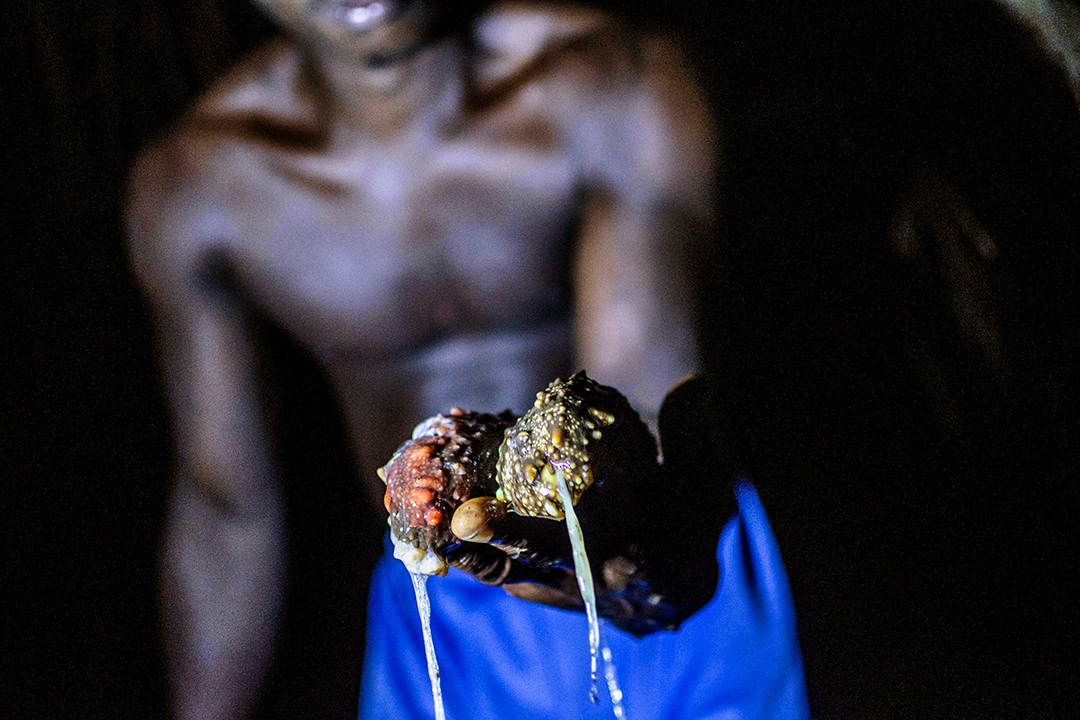Overfishing Threatens East African Sea Cucumbers
ADF STAFF
Artisanal fishermen in East Africa have relied on sea cucumbers for food and income for generations.
Now, the leathery, pickle-shaped species is overfished in many parts of the region, including Kenya, Madagascar, Mozambique, Seychelles and Zanzibar. The species is increasingly smuggled to China and Hong Kong where it is considered a delicacy and often used in traditional Chinese medicine.
“The illegal trade in sea cucumbers is mainly a result of illegal fishing operations in source countries, or they have been traded under the declaration of other species, or they have not been declared and were smuggled with other commodities,” according to a report by the non-governmental organization (NGO) TRAFFIC, which campaigns against illegal wildlife trade.
The scenario means a loss of food and income for local fishermen, who risk their lives scuba diving to pluck sea cucumbers from the ocean floor. A lack of oversight and transparency compounds the issue.
Only six of the 30 African countries with sea cucumber resources have reported their export totals in the past decade, according to TRAFFIC.
In 2003, Kenya banned the use of scuba diving equipment in sea cucumber fishing, but the ban was rarely enforced. In 2006, Tanzania banned the trade of sea cucumbers on its mainland, but it has continued in nearby Zanzibar, TRAFFIC reported.
Sea cucumber trade from Africa to Hong Kong skyrocketed from 2012 to 2018 when 3.8 million kilograms landed in the Chinese territory, where customers pay much higher prices than in Africa, according to ENACT, which is affiliated with the International for Security Studies in Africa and Interpol.
In Zanzibar, for example, 1 kilogram of sea cucumber costs between $9 and $40, while 1 kilogram in China or Hong Kong can fetch up to $3,000.
By 2021, the Food and Agriculture Organization of the United Nations reported that sea cucumber populations in 12 of 30 countries in Africa and the Indian Ocean region “[appear] to be overexploited or fully exploited.”
Often described as “the vacuum cleaners of the ocean,” sea cucumbers consume dead plant and animal matter then excrete cleaner, oxygenated sand. Their overexploitation may result in weakened ecosystems as they are crucial to the health of seagrass meadows and coral reefs, which help sustain other marine life.
“A sea cucumber is almost sort of a moving ecosystem on its own,” Christopher Mah, a zoologist and research associate for the Smithsonian National Museum of Natural History, told National Geographic.
Perhaps because of declining sea cucumber populations, the legal reported sea cucumber trade from Africa to Asia has gradually decreased over the years, mostly due to a decline in the species exported from Madagascar, according to TRAFFIC.
Still, the organization reported, demand “remains high as the number of countries involved in the trade continues to grow, and as commercially caught sea cucumber species are being over exploited, species of lower value are being caught to sustain the demand.”
To decrease illegal sea cucumber trade, TRAFFIC made several recommendations, including:
* Tanzania and Zanzibar should have a consistent legislative framework so that so that illegal trade from Tanzania cannot be cloaked as legal trade from Zanzibar.
* NGOs in emerging export countries such as Mozambique should explore the possibilities of aquaculture to reduce the strain on wild populations and support local livelihoods.
* Build awareness among law enforcement and customs agencies through capacity building and information-sharing to improve the reporting of sea cucumber exports.


Comments are closed.